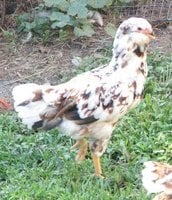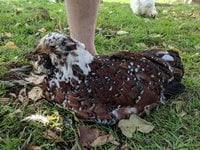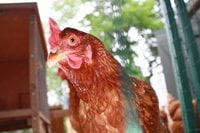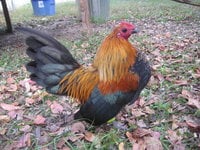From now on whenever I see someone asking for breed recommendations I jump up and shout "ORLOFFS!" I have a lot of friendly breeds (silkies, cochins, OEGB, d'Anvers, modern game, etc) but none are as all-around, overall friendly as my Russian Orloffs. The one I hatched from an egg is the most affectionate bird in the world, she's more cuddly than my cats, and follows at my heel more loyally than the dogs. If I crouch she launches into my lap and burrows her head against me. Those I didn't raise as early on follow me around and beg for attention like puppies. My roosters jump onto my shoulders and preen my hair. Even the hen I just recently added comes running to me and runs around under my feet. I cannot say enough good about them. They're so easy-going and gentle. My big 6 pound cockerel is as gentle as can be with newly hatched chicks, and all my boys love to find special treats and safe nest spots for the hens. Not to mention they are stunning with their intense eyes, bodacious beards, massive size, and eagle beak. They're a favorite of any visitors. Mine live very peacefully in a mixed flock including teeny tiny d'Anvers and massive Langshans. They're not pushovers at all, but they're far from bullies.
The hens are infrequent layers of medium, light-brown eggs but production increases gradually with age. Right now I'm getting three eggs a week from each pullet. They are slow-growers. My 6 months old range in weight from 4 to 6 pounds and my biggest boy, 24" tall, is far from done growing. Very muscular, impressive birds that carry themselves proudly. They're also very playful and goofy. Most roosters are probably going to challenge me if they coming running up behind me, but not the Orloffs. If I hear the distinct thud thud thud of my Orloffs coming up behind me I can expect to hear some very insistent "honking" shortly demanding that I scratch under their beards.
I really cannot say enough good about Russian Orloffs.
I will be honest with my cons:
-They are big birds so they eat a lot. Not as much as production hens, but obviously more than the bantams.
-This is a cull-heavy breed with an active breed group working hard on getting them APA accepted, don't expect a warm welcome if you're purposefully breeding birds without paying any attention to the proposed standard.
-Right now crooked toes and cross-beak is somewhat common, most good breeders have weeded these defects out of their lines, but it still crops up and these birds need to be culled (meaning kept from breeding) for the breed to progress.
-You will fall in love with them and become desperate for more.
The hens are infrequent layers of medium, light-brown eggs but production increases gradually with age. Right now I'm getting three eggs a week from each pullet. They are slow-growers. My 6 months old range in weight from 4 to 6 pounds and my biggest boy, 24" tall, is far from done growing. Very muscular, impressive birds that carry themselves proudly. They're also very playful and goofy. Most roosters are probably going to challenge me if they coming running up behind me, but not the Orloffs. If I hear the distinct thud thud thud of my Orloffs coming up behind me I can expect to hear some very insistent "honking" shortly demanding that I scratch under their beards.
I really cannot say enough good about Russian Orloffs.
I will be honest with my cons:
-They are big birds so they eat a lot. Not as much as production hens, but obviously more than the bantams.
-This is a cull-heavy breed with an active breed group working hard on getting them APA accepted, don't expect a warm welcome if you're purposefully breeding birds without paying any attention to the proposed standard.
-Right now crooked toes and cross-beak is somewhat common, most good breeders have weeded these defects out of their lines, but it still crops up and these birds need to be culled (meaning kept from breeding) for the breed to progress.
-You will fall in love with them and become desperate for more.




